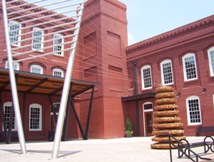For the second year running, Williams & Fudge, Inc. was top-ranked ARM firm in the Best Places to Work in Collections 2010 in the mid-size company category when results were announced last week by insideARM.com.
“When I heard this the first time, and again this year, it was sort of like the People’s Choice awards,” CEO and founder Gary Williams told insideARM.com, clearly thankful and honored by the award. “The fact that our employees were willing to say the things they do in a very honest situation, in a private and confidential setting, it’s that much more pride [and shows] that some days we’re doing things well.”
The annual recognition program aims to highlight the small, medium and large ARM companies in the United States by talking directly to employees responsible for collection, training and management performed over the year. Created by insideARM.com, Best Places to Work in Collections is facilitated by the Best Companies Group.
Williams adds that he wants to continue listening to his staff and “do what’s best for every employee in our organization and not just what’s best for the bottom line.” The Rock Hill, S.C.-based firm was founded in 1986 by Williams and Neil Fudge with the purpose of serving the higher education community, but has taken on a much larger mandate of community outreach in ways unique not only to the firm, but its relationship to state of South Carolina.
The company headquarters was the first cotton factory in Rock Hill and oldest steam powered facility in South Carolina, according to a tasteful and highly informative video on the company’s website. The Old Cotton Factory, as it is called today, was built in 1881 and brought workers from the mountains of North Carolina, eventually contributing to a booming local economy that saw additional factories spring up in the years since. Williams says the company is proud to help revitalize the downtown region and the larger textile corridor of Rock Hill.
“We try supporting the community on a lot of different ways,” he says, noting a series of other programs and community outreach programs extending beyond the historic 45,000 square foot office complex, “because I think it’s important for the business to give back to the community. It’s part of the growth.”
Williams says the company recently donated over 100 bikes along with 700 presents to the Toys for Happiness and Toys for Tots campaigns this year. The company also holds an annual bike race and a recurring program called Back to Pack that collects food for needy children for consumption each weekend, leading to a more productive week in the classroom. “It’s not enough to make money in the community,” he says, “You’ve got to give back to the community.”
The approach to charity and community involvement also includes listening to employees, whose feedback and criticism are given the utmost attention whenever voiced. “We’re family and we try to involve everybody,” he says. “For instance, [many employees] were not pleased with the way United Way contributions were going, so we brought the program in-house.”
Williams says the new system nominates one representative from each team of approximately 10 people to determine where donations are made. “So if an employee comes in with a program — such as a special needs or autistic camp — and they want to participate in it, then they submit an application.”
The new policies are all in the interest of maintaining a strong bond with the Rock Hill community, from which Williams & Fudge draws its 233 employees.
With a combined total of 29 years of collection experience, Williams sought to create an agency that would emphasize personal service to each client in much the same way. Since he purchased the stock of Neil Fudge in November 1991, and more recently involving his two adult children, the firm is now a multi-generational company poised to continue the unique approach in student loans and accounts receivable management for colleges and universities where such collection counts for 99.9 percent of the company’s overall revenue.
The company keeps its position in education collections by supplying college management with information on current support systems provided by the Departments of Education and Health & Human Services, advising deserving borrowers of cancellations, and furnishing current information about the loan programs as provided by the federal government and educational support organizations.
As for a possible three-peat performance in the Best Places to Work poll next year? “It’s about communication,” Williams says, matter-of-factly, “whether it’s community events or whether we’re making internal changes, or we’re promoting someone. Usually we promote from within and communicate with everybody as to what’s going on.” The employees at Williams & Fudge have returned the gesture in kind.





![the word regulation in a stylized dictionary [Image by creator from ]](/media/images/Credit_Report_Disputes.max-80x80.png)
![Cover image for New Agent Onboarding Manuals resource [Image by creator from insideARM]](/media/images/New_Agent_Onboarding_Manuals.max-80x80_3iYA1XV.png)


![[Image by creator from ]](/media/images/New_site_WPWebinar_covers_800_x_800_px.max-80x80.png)
![[Image by creator from ]](/media/images/Finvi_Tech_Trends_Whitepaper.max-80x80.png)
![[Image by creator from ]](/media/images/Collections_Staffing_Full_Cover_Thumbnail.max-80x80.jpg)
![Report cover reads One Conversation Multiple Channels AI-powered Multichannel Outreach from Skit.ai [Image by creator from ]](/media/images/Skit.ai_Landing_Page__Whitepaper_.max-80x80.png)
![Report cover reads Bad Debt Rising New ebook Finvi [Image by creator from ]](/media/images/Finvi_Bad_Debt_Rising_WP.max-80x80.png)
![Report cover reads Seizing the Opportunity in Uncertain Times: The Third-Party Collections Industry in 2023 by TransUnion, prepared by datos insights [Image by creator from ]](/media/images/TU_Survey_Report_12-23_Cover.max-80x80.png)
![Webinar graphic reads RA Compliance Corner - Managing the Mental Strain of Compliance 12-4-24 2pm ET [Image by creator from ]](/media/images/12.4.24_RA_Webinar_Landing_Page.max-80x80.png)